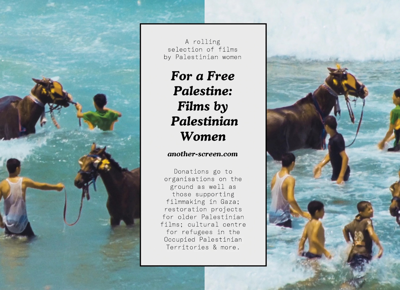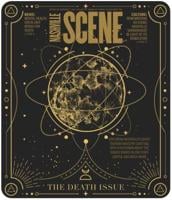The exponential online-ness we’ve experienced since the start of the infernal pandemic has brought some satisfying new streaming options. One of these is feminist streaming platform Another Screen. It’s run by the folks who create the excellent feminist film journal Another Gaze, and it offers more than compelling films. Another Screen is carefully curated, presenting movies around a theme, as well as smart essays, Q&As with filmmakers and other material to provide context that illuminates the work. Take last month’s “[Silence] [...] [Laughter].” Exploring the “psychiatrisation of female killers,” the program featured Marleen Gorris’ underappreciated but riveting 1982 film A Question of Silence, which you may have been lucky enough to catch in the Belcourt’s 2017 Essentials in Feminist Cinema series. You can still read critic Amelia Groom’s insightful essay about the role of laughter in the film. The latest collection, “For a Free Palestine: Films by Palestinian Women,” shows that the curators are able to respond quickly to current events in order to amplify the voices of people most impacted by the recent violent clashes between the Israeli Defense Force and Hamas militants, which left roughly 250 Palestinians dead, including many women and children. The program includes films for children, like Layaly Badr’s animated 1985 short “The Road to Palestine,” which features a young girl living in a refugee camp who has never seen her homeland and learns early on that “struggling is our only way to Palestine.” In the haunting “Your Father Was Born 100 Years Old and So Was the Nakba,” interdisciplinary artist Razan uses Google Street View to show the city of Haifa, with the imaginary voice of the filmmaker’s grandmother describing her search for her son. Throughout, Razan superimposes images of forced relocation. Mahasen Nasser-Eldin’s “The Silent Protest: Jerusalem 1929,” shows the inaugural demonstration of the Palestinian women who would form their people’s women’s movement. Woven throughout are interviews with directors and writings that contextualize the films. Taken as a whole, the program shows that the experiences of Palestinian women — most of whom are part of the diaspora — are diverse and complex, and their stories are crucial to understanding the turmoil faced by women in the region. Streaming on Another Screen is free, but definitely donate to the efforts when you tune in if you’re able. Your dollars will fund the project, and the Another Screen team also contributes proceeds to organizations related to its themes. Learn more at another-screen.com. ERICA CICCARONE
© Copyright 2025
Nashville Scene
615 Main Street, Suite 102, Nashville, TN
| Terms of Use
| Privacy Policy
Powered by BLOX Content Management System from BLOX Digital.



